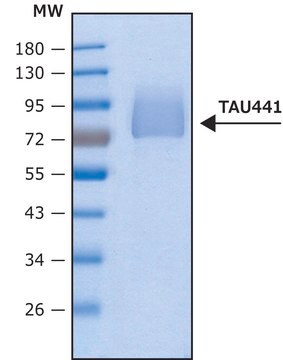AG916
β Amyloid 1-42, aβ, scrambled, TFA, recombinant E. coli
Se connecterpour consulter vos tarifs contractuels et ceux de votre entreprise/organisme
About This Item
Code UNSPSC :
12352202
eCl@ss :
32160405
Nomenclature NACRES :
NA.41
Produits recommandés
Source biologique
Escherichia coli
Niveau de qualité
Pureté
>97%
Forme
powder
Fabricant/nom de marque
Chemicon®
Numéro d'accès NCBI
Numéro d'accès UniProt
Informations sur le gène
human ... APP(351)
Description générale
MOL. WT.: (theoretical 4514.1)
SEQUENCE: Lys-Val-Lys-Gly-Leu-Ile-Asp-Gly-Ala-His-Ile-Gly-Asp-Leu-Val-Tyr-Glu-Phe-Met-Asp-Ser-Asn-Ser-Ala-Ile-Phe-Arg-Glu-Gly-Val-Gly-Ala-Gly-His-Val-His-Val-Ala-Gln-Val-Glu-Phe
PEPTIDE CONTENT: 500 µg per vial
COUNTER ION: TFA
SEQUENCE: Lys-Val-Lys-Gly-Leu-Ile-Asp-Gly-Ala-His-Ile-Gly-Asp-Leu-Val-Tyr-Glu-Phe-Met-Asp-Ser-Asn-Ser-Ala-Ile-Phe-Arg-Glu-Gly-Val-Gly-Ala-Gly-His-Val-His-Val-Ala-Gln-Val-Glu-Phe
PEPTIDE CONTENT: 500 µg per vial
COUNTER ION: TFA
Application
Different researchers claim enhanced activity due to different salts.
The TFA salt is what has been the industry standard.
The HFIP makes the beta-amyloid homogenously monomeric.
The NaOH apparently make it monomeric too and is also water soluble, which the TFA salt and HFIP are not.
The HCl salt is supposed to be more biological, as TFA is not found in the body.
By offering the different salts, it lets the researchers duplicate the different assays that have been developed by other researchers (see below).
TFA: Shu-chuan Jao, S-C, et. al. 1997, Amyloid; Int J Exp. Clinical Invest. 4, 231
HFIP: Stine, W.B. et. al. 2003, J. Biol. Chem, 278, 11612
NaOH: Fezoui, Y., et. al. 2000, Amyloid, 7, 166
HCL: Kanek, I and Tutumi, S., 1997, J. Neurochem, 68, 438
The TFA salt is what has been the industry standard.
The HFIP makes the beta-amyloid homogenously monomeric.
The NaOH apparently make it monomeric too and is also water soluble, which the TFA salt and HFIP are not.
The HCl salt is supposed to be more biological, as TFA is not found in the body.
By offering the different salts, it lets the researchers duplicate the different assays that have been developed by other researchers (see below).
TFA: Shu-chuan Jao, S-C, et. al. 1997, Amyloid; Int J Exp. Clinical Invest. 4, 231
HFIP: Stine, W.B. et. al. 2003, J. Biol. Chem, 278, 11612
NaOH: Fezoui, Y., et. al. 2000, Amyloid, 7, 166
HCL: Kanek, I and Tutumi, S., 1997, J. Neurochem, 68, 438
Research Category
Neuroscience
Neuroscience
Research Sub Category
Neurodegenerative Diseases
Neurodegenerative Diseases
Conditionnement
Salt content is <15%
Forme physique
White lyophilized powder. Resuspend in 1.0% NH4OH at a concentration of 1 mg/mL. Sonicate for 30 seconds to 1 minute after it has gone into solution. To bring into your solution: After resuspension, add 5x or 10x buffer stock (PBS, TBS) and water to bring to 1x buffer.
Stockage et stabilité
Maintain lyophilized material at -20ºC for up to 12 months after date of receipt. After reconstitution maintain at -20ºC to -70ºC for up to 2 weeks in undiluted aliquots. Avoid freeze/thaw cycles to avoid aggregation.
Informations légales
CHEMICON is a registered trademark of Merck KGaA, Darmstadt, Germany
Clause de non-responsabilité
Unless otherwise stated in our catalog or other company documentation accompanying the product(s), our products are intended for research use only and are not to be used for any other purpose, which includes but is not limited to, unauthorized commercial uses, in vitro diagnostic uses, ex vivo or in vivo therapeutic uses or any type of consumption or application to humans or animals.
Code de la classe de stockage
11 - Combustible Solids
Classe de danger pour l'eau (WGK)
WGK 1
Point d'éclair (°F)
Not applicable
Point d'éclair (°C)
Not applicable
Certificats d'analyse (COA)
Recherchez un Certificats d'analyse (COA) en saisissant le numéro de lot du produit. Les numéros de lot figurent sur l'étiquette du produit après les mots "Lot" ou "Batch".
Déjà en possession de ce produit ?
Retrouvez la documentation relative aux produits que vous avez récemment achetés dans la Bibliothèque de documents.
Notre équipe de scientifiques dispose d'une expérience dans tous les secteurs de la recherche, notamment en sciences de la vie, science des matériaux, synthèse chimique, chromatographie, analyse et dans de nombreux autres domaines..
Contacter notre Service technique


